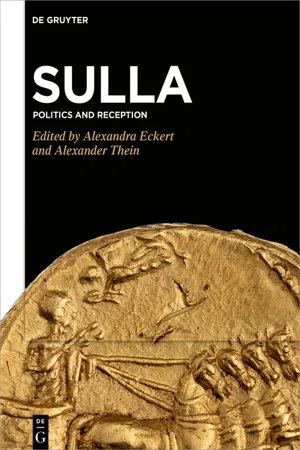Sulla’s Career Before his Consulship
L. Cornelius Sulla was born in 138 B.C. He was a member of the patrician Cornelii gens, but from a branch not recently prominent; he was not closely related to the Scipiones or the Nasicae.1 He held the quaestorship in 107 and was assigned to the consul Marius; that position was prorogued into 106 and 105, during which time Sulla served with Marius in Numidia and led the negotiations with Bocchus which ended with the capture of Jugurtha.2 His relationship with Marius continued in Gaul in 104 and 103, but in 102 and 101 he shifted to the forces of Catulus, perhaps indicating a breakdown of relationship with Marius.3
Up until this point Sulla’s career had proceeded according to the expectations for those in public life in terms of tenure of offices. He held the quaestorship at the age of thirty. He had concentrated thereafter on military activity, rather than activity at Rome, and had not sought the aedileship with its opportunities to engage with the populus in Rome. This kind of specialisation is increasingly evident at this period in career-building among members of the elite.4 The next stage was election to the praetorship and it was at this point Sulla’s career ran into difficulty, with his failure to be elected on his first attempt at the office. Plutarch records Sulla’s own explanation: that he was foiled by an electorate which wanted him first to hold the aedileship so that his African contacts could ensure spectacular shows; but he is rightly sceptical.5 Given the limited evidence for internal politics in the 90s it is not possible to explain Sulla’s initial failure definitively, but a possible answer would be that he lacked a sufficiently high and favourable profile among voters in Rome because his overwhelmingly military trajectory up until that point had kept him away from Rome and from the kinds of activities which made a politician visible, known and therefore an attractive candidate to vote for. A complicating factor in the analysis is that neither the date of his unsuccessful attempt nor that of his successful campaign the following year is secure.6 He could have stood for the office in 93, which would place the unsuccessful campaign towards the end of 95 for tenure in 94; but a case has been made that he stood for the praetorship as early as 99, to hold it in 98 at the minimum age of 40.7 If that argument is held, his praetorship is to be dated to 97. Sulla held the urban praetorship, and then was sent as propraetor to Cilicia; he restored the exiled Ariobarzanes and engaged in the first diplomatic activity between Rome and Parthia.8 He had returned to Rome by the outbreak of the Social War, and his military experience ensured that he played a significant role in that conflict: initially as a legate attached to one of the consuls of 90, L. Iulius Caesar, and then in what appears to have been a more independent role in the fighting in Campania and Samnium.9 He was then elected to the consulship of 88 on his first attempt.
At forty-nine, he held this office at a relatively late age, after a career progression which is likely to have reached the consulship only because the Social War intervened and suddenly created an urgent demand for Sulla’s particular set of skills.10 The focus of his public activities up until this point was outside Rome. This is reflected in his oratory. There is no evidence that he spoke as an advocate in the courts; and on this point, silence bears interpretation, since it seems unlikely that any forensic activity would not have made some impact on the sources given his subsequent reputation.11 He is not known to have addressed a contio (public meeting) up until this point, nor is that silence particularly surprising among men who did not hold the tribunate.12 As urban praetor Sulla would have had to speak in the course of administering justice and may have on occasion presided over the Senate, but neither of these duties will have required lengthy speech or imposed any persuasive demands.13
Nonetheless, there is evidence for Sulla as an orator in a military context. In Sallust’s Jugurtha, indeed, Sallust ascribes to him facundia (eloquence), in the context of the negotiations towards the end of that work between the Romans and Bocchus.14 When Bocchus makes contact with Marius asking him to send envoys to negotiate, Marius chooses A. Manlius and Sulla; and it is Sulla who addresses Bocchus. Sallust gives him a speech as an envoy both at this point in his narrative (in direct statement) and a little later in indirect statement, the result of which is to secur...
